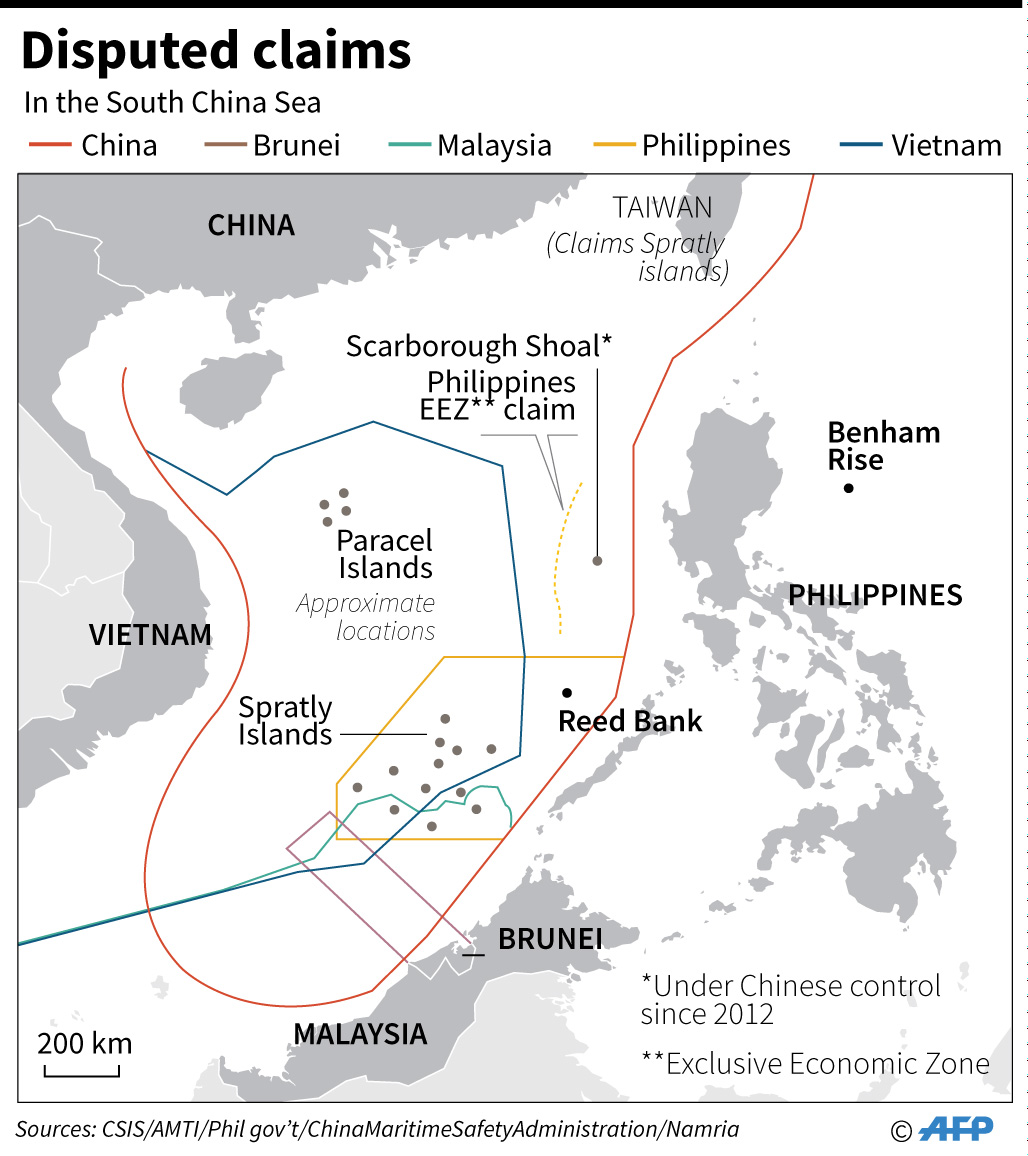
Map showing disputed claims in the South China Sea. Includes locations for Reed Bank and Benham Rise, where Chinese survey ships were seen in previous years, according to the Philippine government. AFP
MANILA, Philippines — A research organization is denouncing attempts by what it described as “antagonistic states” to disrespect and downplay the 2016 arbitral ruling that favored the Philippines’ stand in the South China Sea row.
International think tank Stratbase ADR Institute on Saturday said such attempts are blatant disregard of the Permanent Court of Arbitration’s (PCA) decision and a clear violation of international law.
Dindo Manhit, president of Stratbase ADR Institute, asserted that the July 2016 ruling of the United Nations-backed PCA, which is based in The Hague, Netherlands, is based on the United Nations Convention on the Law of the Sea.
READ: PH wins arbitration case over South China Sea
“The Institute denounces all attempts by antagonistic and coercive states to thwart efforts to uphold and reinforce the 2016 arbitral ruling that underscores the victory of the Philippines and the peaceful resolution of disputes,” he said in a statement.
“We condemn the blatant disregard of the ruling and persistent violation of international law, particularly in the form of gray zone operations, swarming of foreign vessels, and destroying maritime resources within the Philippine territory,” he added.
The PCA ruling invalidated China’s sweeping nine-dash line claim over the South China Sea which encompasses the Philippines’ exclusive economic zone (EEZ) and continental shelf or territorial waters.
Stratbase ADR Institute did not specifically identify any “antagonistic states” but China has been vocal about its opposition to the PCA decision.
READ: ‘Potential threat’: PH military reports Chinese vessels swarming near Iroquois Reef, Sabina Shoal
Ever since, Beijing’s maritime assets have been swarming near atolls and shoals within the Philippines’ EEZ and showing aggression in contested areas of the South China Sea.
Recently, the Chinese Embassy in Manila issued a statement saying that the historic arbitral ruling is “illegal,” and “null and “void.”
READ: China on arbitral ruling on WPS: Illegal, null and void
But Manhit said that the PCA decision proves that “the Philippines is on the right side of history.”
“Rooted in the United Nations Convention on the Law of the Sea, the award demonstrates the rule of law as a great equalizer among states. It represents shared democratic values, particularly mutual respect for sovereignty and territorial rights. Since 2016, the Philippines’ victory has been unanimously lauded, recognized, and supported by states that espouse adherence to the fundamental value of the rule of law,” he explained.
Last July 12, in time for the PCA ruling’s seventh anniversary, Stratbase ADR Institute hosted a forum attended by government officials, members of the diplomatic community, scholars, and policy experts where they exchanged views on the value of the historic decision.
READ: Key points of arbitral tribunal’s verdict on PH-China dispute
During the forum, United States Ambassador to the Philippines MaryKay Carlson reiterated that the 2016 arbitral ruling is “a final and legally binding decision that validates the country’s sovereign rights and jurisdiction over its Exclusive Economic Zone and continental shelf.”
She added that it is “a ruling that found the PRC’s (People’s Republic of China) maritime claims in the South China Sea inconsistent with international law.”
Australian Ambassador to the Philippines Hae Kyong Yu, on the other hand, stressed that her country will continue to work with the Philippines to ensure that the 2016 arbitral ruling is “properly implemented” and “properly followed.”
In the same forum, Stratbase ADR Institute released the result of a Pulse Asia survey it commissioned. The poll showed that at least 80 percent of Filipinos want the Philippines to “form alliances and strengthen its relationships” to further protect its rights in the West Philippine Sea.
RELATED STORY
Hontiveros slams China’s rejection of South China Sea ruling as ‘hypocrisy’